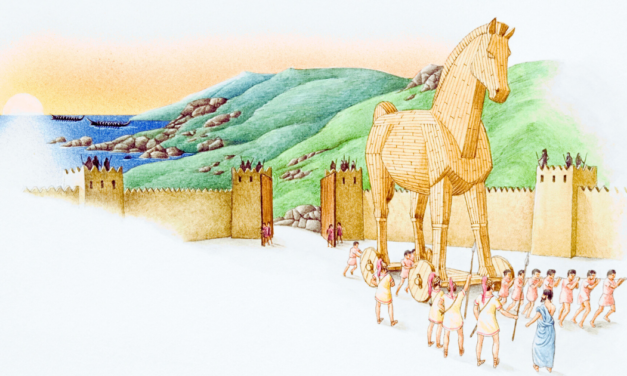As one reads through the Bible, we find progressively detailed prophecies about the identity of the Messiah. Obviously, as the prophecies become increasingly detailed, the field of qualified “candidates” becomes increasingly narrow.
In showing a Jewish person that Jesus is the Messiah, one effective approach is to begin with broad prophecies and then narrow the field to include increasingly specific and detailed prophecies. You might use circles to graphically illustrate your points as you share these prophecies.
As suggested by Stuart Dauermann, 1 seven increasingly detailed “circles of certainty” include:
1. Messiah’s humanity (Genesis 3:15).
2. Messiah’s Jewishness (Genesis 12:1-3; 28:10-15).
3. Messiah’s tribe (Genesis 49:10).
4. Messiah’s family (2 Samuel 7:16; Jeremiah 23:5-6).
5. Messiah’s birthplace (Micah 5:2).
6. Messiah’s life, reception, and death (Isaiah 52:13; 53).
7. Chronology of Messiah’s appearing (Daniel 9:24-26).
Let us look at these in a little more detail.
Circle 1: The Circle of the Messiah’s Humanity
Scripture says that the Messiah had to become a human being. This circle is obviously a very large circle.
The Messiah’s humanity is prophetically spoken of in Genesis 3:15, when God is pronouncing judgment against the serpent following the fall of Adam and Eve:
And I will put enmity between you and the woman, and between your offspring and hers; he will crush your head, and you will strike his heel.2
The word “offspring” refers to descendants. The Messiah would be a descendant of the woman — that is, He would be a human being. We find this fulfilled in Galatians 4:4-5:
But when the time had fully come, God sent his Son, born of a woman, born under law, to redeem those under law, that we might receive the full rights of sons.
Circle 2: The Circle of the Messiah’s Jewishness
Scripture says that the Messiah had to be Jewish — that is, He had to be a descendant of Abraham, Isaac, and Jacob. This narrows the circle considerably. Of all human beings who have ever lived, only Jewish human beings would qualify.
Point the Jewish person to Genesis 12:1-3, where God makes a covenant with Abraham (the “father” of the Jews):
The LORD had said to Abram, “Leave your country, your people and your father’s household and go to the land I will show you. I will make you into a great nation and I will bless you; I will make your name great, and you will be a blessing. I will bless those who bless you, and whoever curses you I will curse; and all peoples on earth will be blessed through you.”
Then point the Jewish person to Genesis 28:10-15:
Jacob left Beersheba and set out for Haran. When he reached a certain place, he stopped for the night because the sun had set. Taking one of the stones there, he put it under his head and lay down to sleep. He had a dream in which he saw a stairway resting on the earth, with its top reaching to heaven, and the angels of God were ascending and descending on it. There above it stood the LORD, and he said: “I am the LORD, the God of your father Abraham and the God of Isaac. I will give you and your descendants the land on which you are lying. Your descendants will be like the dust of the earth, and you will spread out to the west and to the east, to the north and to the south. All peoples on earth will be blessed through you and your offspring. I am with you and will watch over you wherever you go, and I will bring you back to this land. I will not leave you until I have done what I have promised you.”
These Bible passages indicate that the promised seed (in Genesis 3:15) was to come through the line of Abraham, Isaac, and Jacob.
Circle 3: The Circle of the Messiah’s Tribal Identity
The circle gets even narrower when one demonstrates that the Messiah had to come from the tribe of Judah. This is shown in Genesis 49:10:
The sceptre will not depart from Judah, nor the ruler’s staff from between his feet, until he comes to whom it belongs and the obedience of the nations is his.
Here Jacob is on his deathbed. Before he dies, he affirms that the sceptre (of the ruling Messiah) would be from the tribe of Judah.
Circle 4: The Circle of the Messiah’s Family
Scripture tells us that the Messiah had to be from David’s family. This narrows the circle still further. We see this affirmed in 2 Samuel 7:16:
Your [i.e., David’s] house and your kingdom shall endure for ever before me; your throne shall be established for ever.
We also read in Jeremiah 23:5-6:
“The days are coming,” declares the LORD, “when I will raise up to David a righteous Branch, a King who will reign wisely and do what is just and right in the land. In his days Judah will be saved and Israel will live in safety. This is the name by which he will be called: The LORD Our Righteousness.”
Clearly the ruling Messiah had to come from the family of David.
Circle 5: The Circle of the Messiah’s Birthplace
Scripture clearly prophesies that the Messiah was to be born in Bethlehem. This narrows the circle of possible candidates for the Messiah tremendously. Micah 5:2 tells us:
“But you, Bethlehem Ephrathah, though you are small among the clans of Judah, out of you will come for me one who will be ruler over Israel, whose origins are from of old, from ancient times.”
So far we have seen that the Messiah had to become a human being, had to be a Jew, had to be from the tribe of Judah and the family of David, and He must be born in Bethlehem (a small, insignificant city in ancient times). Failure to fulfill any one of these conditions disqualifies a person as a possible candidate.
Circle 6: The Circle of the Messiah’s Manner of Life, Rejection, and Death
Regarding the Messiah’s manner of life, rejection, and death, point the Jewish person to Isaiah 53. Note the following excerpts:
Who has believed our message and to whom has the arm of the LORD been revealed? He grew up before him like a tender shoot, and like a root out of dry ground. He had no beauty or majesty to attract us to him, nothing in his appearance that we should desire him. He was despised and rejected by men, a man of sorrows, and familiar with suffering. Like one from whom men hide their faces he was despised, and we esteemed him not. Surely he took up our infirmities and carried our sorrows, yet we considered him stricken by God, smitten by him, and afflicted. (Isa. 53:1-4).
He was oppressed and afflicted, yet he did not open his mouth; he was led like a lamb to the slaughter, and as a sheep before her shearers is silent, so he did not open his mouth. By oppression and judgment he was taken away. And who can speak of his descendants? For he was cut off from the land of the living; for the transgression of my people he was stricken. He was assigned a grave with the wicked, and with the rich in his death, though he had done no violence, nor was any deceit in his mouth. (Isa. 53:7-9).
Note from these verses that: (1) The Messiah was to be despised and rejected by His fellow Jews. (2) He would be put to death following a judicial proceeding. (3) He would be guiltless. Obviously these facts about the Messiah narrow the circle still further.
Circle 7: The Circle of Chronology
Point the Jewish person to Daniel 9:24-26:
Seventy ‘sevens’ are decreed for your people and your holy city to finish transgression, to put an end to sin, to atone for wickedness, to bring in everlasting righteousness, to seal up vision and prophecy and to anoint the most holy.
Know and understand this: From the issuing of the decree to restore and rebuild Jerusalem until the Anointed One, the ruler, comes, there will be seven ‘sevens,’ and sixty-two ‘sevens.’ It will be rebuilt with streets and a trench, but in times of trouble. After the sixty-two ‘sevens,’ the Anointed One will be cut off and will have nothing. The people of the ruler who will come will destroy the city and the sanctuary. The end will come like a flood: War will continue until the end, and desolations have been decreed.
Regarding this passage, note the following facts: (1) The city would be rebuilt, as would the Temple. (2) The Messiah would come. (3) The Messiah would be “cut off” (die) but not for Himself. (4) The city and the Temple would be destroyed. Note especially that the Messiah had to come and die prior to the destruction of the second temple, which occurred in A.D. 70.
Clearly, this narrows the circle of potential candidates incredibly. Is there anyone who has fulfilled all these conditions? Is there anyone who was a human being, a Jew, from the tribe of Judah and the family of David, born in Bethlehem, was despised and rejected by the Jewish people, died as a result of a judicial proceeding, was guiltless, and came and died before the destruction of the second temple in A.D. 70? Yes there was, and His name was Jesus!
To further demonstrate that Jesus fulfilled the messianic prophecies of the Old Testament, note the following facts, taken from Appendix B of my book Christ Before the Manger: The Life and Times of the Preincarnate Christ.3 These prophecies — taken together — narrow the field so much that there can be no doubt as to who the Messiah is.
MESSIANIC PROPHECIES FULFILLED IN CHRIST
From the Book of Genesis to the Book of Malachi, the Old Testament abounds with anticipations of the coming Messiah. Numerous predictions—fulfilled to the “crossing of the t” and the “dotting of the i” in the New Testament—relate to His birth, life, ministry, death, resurrection, and glory.
Some liberal scholars have attempted to argue that these prophecies were made after Jesus lived, not before. They have suggested that the books of the Old Testament were written close to the time of Christ and that the messianic prophecies were merely Christian inventions. But to make this type of claim is to completely ignore the historical evidence. Indeed, Norman Geisler and Ron Brooks point out:
Even the most liberal critics admit that the prophetic books were completed some 400 years before Christ, and the Book of Daniel by about 167 B.C. Though there is good evidence to date most of these books much earlier (some of the Psalms and earlier prophets were in the eighth and ninth centuries B.C.), what difference would it make? It is just as hard to predict an event 200 years in the future as it is to predict one that is 800 years in the future. Both feats would require nothing less than divine knowledge.4
God’s ability to foretell future events is one thing that separates Him from all the false gods. Addressing the polytheism of Isaiah’s time, God said:
• “Who then is like me? Let him proclaim it. Let him declare and lay out before me what has happened since I established my ancient people, and what is yet to come—yes, let him foretell what will come” (Isa. 44:7).
• “Do not tremble, do not be afraid. Did I not proclaim this and foretell it long ago? You are my witnesses. Is there any God besides me? No, there is no other Rock; I know not one” (Isa. 44:8).
• “…Who foretold this long ago, who declared it from the distant past? Was it not I, the LORD? And there is no God apart from me…” (Isa. 45:21).
• “I foretold the former things long ago, my mouth announced them and I made them known; then suddenly I acted, and they came to pass…. Therefore I told you these things long ago; before they happened I announced them to you so that you could not say, ‘My idols did them; my wooden image and metal god ordained them’” (Isa. 48:3, 5).
Of course, anyone can make predictions—that is easy. But having them fulfilled is another story altogether. “The more statements you make about the future and the greater the detail, the better the chances are that you will be proven wrong.”5 But God was never wrong; all the messianic prophecies in the Old Testament were fulfilled specifically and precisely in the person of Jesus Christ.
Jesus often indicated to listeners that He was the specific fulfillment of messianic prophecy. For example, He made the following comments on different occasions:
• “Do not think that I have come to abolish the Law or the Prophets; I have not come to abolish them but to fulfill them” (Matt. 5:17).
• “But this has all taken place that the writings of the prophets might be fulfilled” (Matt. 26:56).
• “This is what I told you while I was still with you: Everything must be fulfilled that is written about me in the Law of Moses, the Prophets and the Psalms” (Luke 24:44).
• “You diligently study the Scriptures because you think that by them you possess eternal life. These are the Scriptures that testify about me, yet you refuse to come to me to have life” (John 5:39-40).
• “If you believed Moses, you would believe me, for he wrote about me. But since you do not believe what he wrote, how are you going to believe what I say?” (John 5:46-47).
• “Then he rolled up the scroll, gave it back to the attendant and sat down. The eyes of everyone in the synagogue were fastened on him, and he began by saying to them, ‘Today this scripture is fulfilled in your hearing’” (Luke 4:20-21).
An in-depth study of the messianic prophecies in the Old Testament is beyond the scope of this article. However, the chart below lists some of the more important messianic prophecies that were directly fulfilled by Jesus Christ.
Table B.1MESSIANIC PROPHECIES FULFILLED BY JESUS CHRIST
Topic Old Testament Prophecy New Testament Fulfillment in Christ
Seed of woman Genesis 3:15 Galatians 4:4
Line of Abraham Genesis 12:2 Matthew 1:1
Line of Jacob Numbers 24:17 Luke 3:23, 34
Line of Judah Genesis 49:10 Matthew 1:2
Line of Jesse Isaiah 11:1 Luke 3:23, 32
Line of David 2 Samuel 7:12-16 Matthew 1:1
Virgin Birth Isaiah 7:14 Matthew 1:23
Birthplace: Bethlehem Micah 5:2 Matthew 2:6
Forerunner: John Isaiah 40:3; Malachi 3:1, Matthew 3:3
Escape into Egypt Hosea 11:1 Matthew 2:14
Herod kills children Jeremiah 31:15 Matthew 2:16
King Psalm 2:6 Matthew 21:5
Prophet Deut 18:15-18 Acts 3:22-23
Priest Psalm 110:4 Hebrews 5:6-10
Judge Isaiah 33:22 John 5:30
Called “Lord” Psalm 110:1 Luke 2:11
Called “Immanuel” Isaiah 7:14 Matthew 1:23
Anointed by Holy Spirit Isaiah 11:2 Matthew 3:16-17
Zeal for God Psalm 69:9 John 2:15-17
Ministry in Galilee Isaiah 9:1-2 Matthew 4:12-16
Ministry of miracles Isaiah 35:5-6 Matthew 9:35
Bore world’s sins Psalm 22:1 Matthew 27:46
Ridiculed Psalm 22:7-8 Matthew 27:39, 43
Stumbling stone to Jew Psalm 118:22 1 Peter 2:7
Rejected by own people Isaiah 53:3 John 7:5, 48
Light to Gentiles Isaiah 60:3 Acts 13:47-48
Taught parables Psalm 78:2 Matthew 13:34
Cleansed the temple Malachi 3:1 Matthew 21:12
Sold for 30 shekels Zechariah 11:12 Matthew 26:15
Forsaken by disciples Zechariah 13:7 Mark 14:50
Silent before accusers Isaiah 53:7 Matthew 27:12-19
Hands and feet pierced Psalm 22:16 John 20:25
Heart broken Psalm 22:14 John 19:34
Crucified with thieves Isaiah 53:12 Matthew 27:38
No bones broken Psalm 22:17 John 19:33-36
Soldiers gambled Psalm 22:18 John 19:24
Suffered thirst on cross Psalm 69:21 John 19:28
Vinegar offered Psalm 69:21 Matthew 27:34
Christ’s prayer Psalm 22:24 Matthew 26:39
Disfigured Isaiah 52:14 John 19:1
Scourging and death Isaiah 53:5 John 19:1, 18
His “forsaken” cry Psalm 22:1 Matthew 27:46
Committed self to God Psalm 31:5 Luke 23:46
Rich man’s tomb Isaiah 53:9 Matthew 27:57-60
Resurrection Psalm 16:10; 22:22 Matthew 28:6
Ascension Psalm 68:18 Luke 24:50-53
Right hand of God Psalm 110:1 Hebrews 1:3
Any reasonable person who examines these Old Testament prophecies in an objective manner must conclude that Jesus was the promised Messiah. “If these messianic prophecies were written hundreds of years before they occurred, and if they could never have been foreseen and depended upon factors outside human control for their fulfillment, and if all of these prophecies perfectly fit the person and life of Jesus Christ, then Jesus had to be the Messiah.”6
Indeed, Christ on three different occasions directly claimed in so many words to be the “Christ.” (Note that the word Christ is the Greek equivalent of the Hebrew word Messiah.) For example, in John 4:25 Jesus encountered a Samaritan woman who said to Him, “I know that Messiah” (called Christ) “is coming….” To which Jesus replied, “I who speak to you am he” (v. 26). Later, Jesus referred to Himself in the third person, in His high priestly prayer to the Father, as “Jesus Christ, whom you have sent” (John 17:3). In Mark 14:61-62, we find the high priest asking Jesus, “Are you the Christ, the Son of the Blessed One?”—to which Jesus declared unequivocally, “I am….”
Others also recognized that Jesus was the prophesied Messiah. In response to Jesus’ inquiry concerning His disciples’ understanding of Him, Peter confessed: “You are the Christ…” (Matt. 16:16). When Jesus said to Martha, “I am the resurrection and the life. He who believes in me will live, even though he dies; and whoever lives and believes in me will never die. Do you believe this?” Martha answered, “Yes, Lord…. I believe that you are the Christ…” (John 11:25-27).
Some may ask why Jesus didn’t explicitly claim more often to be the prophesied Messiah. Bible scholar Robert L. Reymond offers us some keen insights in answering this question:
Jews of the first century regarded the Messiah primarily as Israel’s national deliverer from the yoke of Gentile oppression….Had Jesus employed uncritically the current popular term as a description of Himself and His mission before divesting it of its one-sided associations and infusing it with its richer, full-orbed Old Testament meaning, which included the work of the Messiah as the Suffering Servant of Isaiah, His mission would have been gravely misunderstood and His efforts to instruct the people even more difficult. Consequently, the evidence suggests that He acknowledged He was the ‘Christ’ only where there was little or no danger of His claim being politicized — as in the case of the Samaritan woman, in private conversation with His disciples (at the same time, demanding that they tell no one that He was the Messiah), in semi-private prayer, or before the Sanhedrin when silence no longer mattered or served His purpose.7
Even if Jesus had never verbally claimed to be the prophesied Messiah, the very fact that He was the precise fulfillment of virtually hundreds of messianic prophecies cannot be dismissed, as some liberal critics have attempted. The odds against one person fulfilling all these prophecies are astronomical; indeed, it is impossible to calculate. But fulfill these prophecies, Jesus did—and then He added proof upon proof regarding His identity by the many astounding miracles He performed. Truly, Jesus is the Messiah.
— Ron Rhodes
NOTES
1. Stuart Dauermann, n.p., n.d.
2. Scripture quotations are from the HOLY BIBLE, NEW INTERNATIONAL VERSION®. Copyright © 1984 by the International Bible Society. Used by permission of Zondervan Publishing House. All rights reserved. The “NIV” and “New International Version” trademarks are registered in the United States Patent Trademark Office by International Bible Society. Use of either trademark requires the permission of International Bible Society.
3. Ron Rhodes, Christ Before the Manger: The Life and Times of the Preincarnate Christ (Grand Rapids: Baker Book House, 1992), 233-237.
4. Norman Geisler and Ron Brooks, When Skeptics Ask (Wheaton, IL: Victor Books, 1990), 115.
5. John Ankerberg, John Weldon, and Walter C. Kaiser, The Case for Jesus the Messiah (Chattanooga: The John Ankerberg Evangelistic Association, 1989), 16.
6. Ibid., 94.
7. Robert L. Reymond, Jesus, Divine Messiah: The New Testament Witness (Phillipsburg, NJ: Presbyterian and Reformed Publishing, 1990), 47.








